Health Humanities Grand Rounds
 Since 2016, the Health Humanities Grand Rounds Carolina Seminar has hosted a monthly speaker series that has grown into a robust discussion venue for students and faculty from across UNC’s campus and beyond. Speakers are invited to give problem-based talks and lead discussion about their research, raising methodological or theoretical questions to spark conversation and collaboration. By both promoting interdisciplinary research and providing an occasion for faculty and students from across departments and divisions to come together, Health Humanities Grand Rounds has become a touchstone of health humanities collaborations at UNC.
Since 2016, the Health Humanities Grand Rounds Carolina Seminar has hosted a monthly speaker series that has grown into a robust discussion venue for students and faculty from across UNC’s campus and beyond. Speakers are invited to give problem-based talks and lead discussion about their research, raising methodological or theoretical questions to spark conversation and collaboration. By both promoting interdisciplinary research and providing an occasion for faculty and students from across departments and divisions to come together, Health Humanities Grand Rounds has become a touchstone of health humanities collaborations at UNC.
During the 2021-2022 academic year, Health Humanities Grand Rounds events will take place via Zoom. See below for details about how to register for upcoming events. We will continue to update this page as we book speakers, hold events, and upload videos. You can view past HHGR lectures on the HHIVE Lab YouTube channel.
2022-2023 Speakers
Cindy Weinstein, PhD & Bruce Miller, MD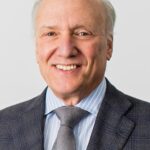
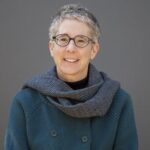
“A Dual Memoir: Literature, Neurology, and Finding the Right Words“
September 28, 2022 at 4:00pm via Zoom
Authors Cindy Weinstein and Bruce Miller intertwine literature, medicine, and science to tell the story of Weinstein’s experience with her father’s dementia.
Dr. Weinstein is a professor of literature at the California’s Institute of Technology in Pasadena, California, and Dr. Miller is a neurologist and director of the Memory and Aging Center at the University of California, San Francisco.
Read Maya Groff’s reflection on Dr. Weinstein’s and Dr. Miller’s HHGR on the HHIVE Lab Blog.
2021-2022 Speakers
Ana Vinea, PhD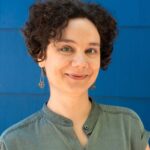
“Psychiatry, Law, and Revolution: A View from Egypt”
April 13, 2022 at 4:00pm via Zoom
Ana Vinea, PhD is an assistant professor in the Department of Asian Studies, University of North Carolina at Chapel Hill. After she received a Ph.D. in anthropology from the City University of New York, she was a postdoctoral fellow in the Society of Fellows, University of Michigan. She is an anthropologist of the Middle East working at the intersection of medical anthropology and the anthropology of religion with interests in science, health, psychiatry, Islam, and popular culture in contemporary Egypt. Her book manuscript in progress, “Healing Dilemmas: Islam, Psychiatry, and Affliction in Contemporary Egypt,” examines transformations and contestations of Islamic healing practices through their intersections with psychiatry and modern science.
Daniel Romero Suárez, PhD
“What Can Poetry Tell Us About Disease? The Case of Latin American Cancer Author-Patients”
March 9, 2022 at 4:00pm via Zoom
The study of the work of Latin American cancer author-patients will be the starting point to explore preliminary answers to the following questions: What are some limitations of linear biomedical narratives? Is linearity compatible with precarious health experiences? How do Latin American poetic traditions insert past political violence in current cancer diagnosis? Can cancer be considered a communal experience?
Daniel Romero Suárez is a Mellon Postdoctoral Fellow for Digital and Public Humanities at Vanderbilt University. He holds a Ph.D. in Spanish from the same institution, and his doctoral research focused on the intersections of medicine, literature, and collective memory in Latin American poetry. Daniel has published peer-reviewed articles and participated in academic conferences. He has also engaged in non-traditional academic settings to bring scholarly knowledge into dialogue with the concerns of vulnerable communities. Thanks to the Curb Public Scholarship (2019-2021), Daniel founded and directed “Poesía en Nashville,” a community initiative that offered pandemic creative writing workshops for the Hispanic community in Middle Tennessee. As a postdoctoral fellow, Daniel leads a research project titled “An Oral History of the Coronavirus” that includes the implementation of digital resources and platforms that will tell part of the history of how the Hispanic communities in Nashville have lived throughout the pandemic.
Mara Buchbinder, PhD (UNC School of Medicine, Department of Social Medicine) 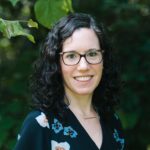
“Scripting Death: Stories of Assisted Dying in America“
January 20, 2022
Dr. Buchbinder presents key findings from her new book about how the legalization of assisted dying is changing possibilities for choice and control at the end of life—and in doing so, changing the kind of event we understand death to be.
Mara Buchbinder, PhD is Professor and Vice Chair of the Department of Social Medicine, Adjunct Professor of Anthropology, and core faculty in the Center for Bioethics at UNC-Chapel Hill.
Raj Telhan, MD (UNC School of Medicine, Physical Medicine and Rehabilitation)
“Medicine & the Humanities: Vocabularies in Practice”
November 9, 2021
Raj is a physician and writer who works at the intersection of literature, medicine, and culture. He is the author of essays, longform journalism, and criticism bridging science and the humanities. His writing appears in the Virginia Quarterly Review and The American Scholar. His VQR essay, “Begin Cutting,” was anthologized in the Best American Science and Nature Writing. Other honors include the Smith-Shanubi Scholarship at the New York State Writers Institute and the Staige D. Blackford Prize for Nonfiction for his VQR cover story, “Foreign Bodies.” In this talk, Dr. Telhan explores the role of humanities in medicine.
Raj Telhan, MD studied Literature and Medicine at the University of Virginia, where he was a Crispell Scholar. He completed his residency in rehabilitation medicine at NYPH/Columbia-Cornell University Medical Center, graduating as Chief Resident. After completing an interventional spine fellowship at the University of Virginia, he began clinical practice as an academic attending and teacher of medical humanities. He is a triple board-certified Assistant Professor of Rehabilitation Medicine at UNC-Chapel Hill School of Medicine and serves as a Contributing Editor for the Virginia Quarterly Review.
Kristina Gupta, PhD (Wake Forest University, Department of Women’s Gender, and Sexuality Studies)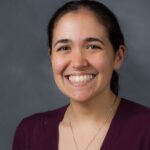
“Beyond “Medical Necessity”: Transition-Related Care Before and During the Pandemic“
October 27, 2021
In this talk, Dr. Kristina Gupta uses the case study of transition-related care to argue for the importance of moving beyond the frameworks of disease and “medical necessity” to justify medical interventions. Frameworks of disease and “medical necessity” almost invariably pathologize some who do not seek medical intervention while leaving others without social support or funding for the medical interventions they need to make their lives more livable. In place of the frameworks of disease and “medical necessity,” she proposes using frameworks such as “flourishing,” “livability,” and “fulfillment,” while recognizing that there is no perfect framework. At the end of the talk, she briefly explores the use of the language of medical necessity during the pandemic, arguing that this usage has led to the postponement of transition-related care as well as reproductive justice-related care, and she considers whether alternative frameworks like “livability” would produce different outcomes for marginalized groups and individuals.
Kristina Gupta, PhD is an Associate Professor in the Department of Women’s, Gender, and Sexuality Studies at Wake Forest University. Her research interests are in the areas of contemporary asexual identities and gender, health, and science. She is the author of Medical Entanglements: Rethinking Feminist Debates about Healthcare (Rutgers UP, 2019), a co-editor of Queer Feminist Science Studies: A Reader (U of Washington P, 2017), and the author of a number of peer-reviewed articles.
Mike Winstead, MD (UNC Pediatrics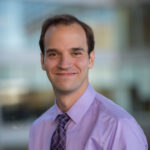 )
)
“The Transplanted Self: Genetics, Race, and Pragmatism“
October 6, 2021
Medicine describes the immune system’s distinction between normal and diseased cells as an immunological “self.” Receiving a stem cell or bone marrow transplant combines the immunological “selves” of donor and recipient, which can lead to life-threatening complications. Safely navigating this process involves genetic matching of the donor and recipient immune systems, a process that roughly tracks with the social construct of race. Stem cell transplants (and their complications) occur at a nexus of genetics, ancestry, race, and “selfhood” that medicine has not explored, due to a pragmatic focus on tangible problems and concrete solutions.
Mike Winstead, MD is an assistant professor of pediatrics specializing in pediatric hematology-oncology and bone marrow transplantation. He is interested in the immune system as an intellectual development of the mid-20th century and in the social interactions of immunity, health, and illness.

